Help the Witch Read online
Page 2
The sign is incorrect. Wentworth – first name Richard – is not in fact well; he died in 1712, long after he had finished his stint as the reverend of Grindlow. But in the 1660s, when the plague hit the village to such devastating effect, having arrived from London in a box of cloth sent to a local tailor, Wentworth did stay well while his parishioners died: dozens of them each month. It was his decision to seal the village in, to prevent the spreading of the disease to neighbouring Derbyshire villages, for which he is remembered as a hero, but which many of the residents might not have felt quite so positive about at the time. In the hot summer of 1666 the contagion increased, and seventy-four villagers died in that July alone, including Wentworth’s wife and two-year-old baby son. Residents of the neighbouring village, Hatherford, left food at a number of sites around the edge of Grindlow, including the spring that was later named after the reverend. For payment, Grindlow villagers left coins. These they soaked in vinegar, as a rudimentary form of sterilisation.
Matthew asked me how the book was going and I admitted I had not yet written a sentence of it. There is plenty of time until I’m back in a full-time teaching job and I feel that a period of faffing is an important part of any big, intense piece of writing, but I had hoped I’d have got properly under way with the book by now. I have a mental barrier with it not unlike the mental barrier that makes me feel that the world beyond the snow and the hills is far away and inaccessible. I told Matthew about the ghost cat – which remained quiet for the duration of his stay – and the carved owl falling into the bin. After he’d left and I’d stripped the bed in the spare room, I noticed that he’d thrown it back in there, just to wind me up, the bastard.
19 DECEMBER
Christmas is out there somewhere, beginning to happen. I am glad to be away from it. Not it so much as the stuff around it. The needless panic, the commercial excess, the small talk centred around the needless panic and commercial excess. I imagine Chloe is out there in it, somewhere. I picture her with a Christmas Person, introducing him to her parents. He doesn’t work in academia. He is helping to wash up and decorate the tree, and makes his own signature drink, which everyone enjoys. He has some books, but only five or six – not the amount of books that might become an impediment when you’re in a relationship with a person. Everyone – not excluding me – is so relieved to see her finally with a Christmas Person.
She’s not in my dreams so much any more, but I dream a lot here. Often, but not always, in the dreams, great violence is about to be done to me. In the most recent, I was walking down a corridor, fumbling for a light switch in impossible blackness. As I reached for the wall for some balance, I felt three fleshless hands violently tickling my ribs. When I wake from these nightmares and I switch my phone on to look at the time, it is always 3.46 or 3.47 a.m. I suspect that once, many years ago, at 3.44 a.m., something very bad happened in this house or in the space where this house now stands. Sometimes when I can wake up, I hear the phantom-cat – or rats, or is it a dog? – noise but it seems a little less keening now, calmer.
20 DECEMBER
Walked to Hatherford today and bought twenty-four packets of crisps. Nineteen of them still exist.
21 DECEMBER
Solstice. White and hard and sharp. It’s over a week since I wrote to Conkleton about the slugs and the mould – also reminding him about the extractor fan – but there has been no response. The shower has started leaking and scalded my thigh yesterday. Water is pouring from the broken rear gutter. I saw him out on the track tonight when I’d emerged from the shower, but by the time I had gone to find him, he had vanished. He doesn’t move quickly, with that bad foot of his, so I walked in the direction of the big house, sure that I would catch him up. It’s a much larger version of my house: same high ceilings, soot-grey bricks and thick walls. Another owl – the same as the one on my gatepost; a little ugly, if I’m honest – is carved on the arch above the door. Peter Winfield has told me that it’s the family crest: ‘Reet proud of it he is, too. He’s got blazers wi’ it on.’
There were no lights on, although the curtains were open, and I could see a huge manger set up in the living room. I know Conkleton is religious, but I wonder why he’d go to this effort: Peter Winfield told me Conkleton’s wife died three years ago and that his only remaining relative is his son, who lives in New Zealand, and doesn’t tend to visit. Despite the darkness of the house, something told me somebody was there, so I checked on the kitchen side. Peering through the kitchen into the dining room beyond, I could just see a figure that appeared to be Conkleton, standing against the back wall. I knocked on the window, but I couldn’t get his attention. It was as if he was in some kind of trance, pinned to the spot. I did not think he was in any serious danger, though, so I trudged back home. I am so tired and I think I might have a problem with my Achilles tendon. Perhaps everyone gets foot injuries around here? When I arrived home, Matthew called to ask if he’d left one of his turquoise rings anywhere in my spare room. I said I would look, and told him that he was a wanker for putting the owl in the bin. He told me he had no knowledge of any such thing.
28 DECEMBER
This place – this part of the Peak District – has its own particular winter smell. It followed me on a walk today: a very long one. It’s different from any smell I’ve smelt while walking anywhere else. There is almost nothing of my former home in it. It’s a little woodsmoky, but also tinged with manure and mournful old stone and a hint of Victorian industry. I feel different while within this smell. People are expected to be the same person all their life, but different places make us different people. I’m not talking about the impact of an environment over time; I’m talking about something instantaneous. My hair is different here, my outlook, even my face, maybe. I am more lethargic, which is unlike me. I don’t sleep fully, though, because of the nightmares at 3.44 and my active mind.
I dozed and read and snacked through the festive season, as many people will do, the notable difference being that I did it all alone. For my Christmas meal, I had a bagel smeared with Marmite. I did not mind. It was a very pleasant bagel.
Yesterday I decided the solution to my insomnia is to physically exhaust myself. I walked down the valley, below the snowline, into the limestone gorge, until I was nine full miles away from home, over the border from Dark Peak into White and only by turning around and retracing my steps could I make it back before nightfall. A few festive family walking parties shuffled about nearer the road, but mostly I was alone. I slipped on limestone and fell on top of my camera, amazingly neither breaking it nor me. White Peak limestone makes for less bleak hills than the gritstone of the Dark Peak, but it always feels like it’s getting away from you. In the winter, nothing ever feels certain in life when you’re on top of it. I will do well not to perish as a result of it before spring arrives. Shaken, I passed through a gate, noting the top section of a freshly decapitated deer on the path in front of me: the work, no doubt, of poachers. Its face stayed with me. I could feel the bruise I’d sustained through falling, but as I progressed on the walk, my Achilles pain dissipated.
I got home and sank into a deep bath and thanked myself for changing the sheets in the morning. They felt good against my skin and as I turned and snuggled hard to Chloe, I was reminded of how seamlessly our bodies – my long one, and her tiny one – slotted together against the odds. I noticed she did not emanate her usual warmth, though. There was purring at the bottom of the bed, near our feet.
‘You’re so cold,’ I said.
‘Can’t help it. Always been that way,’ Chloe said, in what was not her voice.
I turned on the light. The bed was empty. The purring had stopped. The top of the room seemed very large and wastefully utilised.
It’s morning now, and I am benefiting from the novelty of not having woken up from a nightmare at 3.44 a.m. I do not feel alone in the house, though. I don’t think I ever have.
2 JANUARY
I have been thinking more about Winifred Cowlishaw
and the Cowlishaw graves. What must it have taken to have done that, bury your whole family, alone, in the space of one week? The question is not how you recover from that, because surely you don’t. The question is how you find a way to carry on and be in the world, even a different world, with very different standards of hardship and suffering from those we have now. The route into the village by road or footpath is deceptive and makes the graves seem far away, but as the crow flies they’re less than half a mile from here. The cottage beside them, where the Cowlishaw family lived, is long demolished, but were I in this house in the seventeenth century, we’d have pretty much been next-door neighbours: all that lies between us is Conkleton’s place and the untamed, slaloming woodland beyond it. Nothing has come into that space since, not even one of the lead or fluorspar mines that dominate the area.
On my walk today I saw five dead moles nailed to a fence. ‘It’s showin’ off, trophyism, a warning,’ Winfield has told me. He traps and kills them himself, but just to keep their hills under control. He says he’d never do something like that. I told him about the night I saw Conkleton pinned to the wall. He did not look surprised. Winfield said he tries not to go down there. I looked at his face again and saw more weather. It’s an excellent face. Looking good for your age and looking young for your age are often not the same thing.
The village shop is stocking a new jalapeño snack. The four bags I have consumed so far have been quite addictive. These things are often just sold for a trial period, so it’s good to be supportive.
Crows are fucking massive here.
6 JANUARY
This is just a diary and I suspect (in fact, hope) nobody else will ever read it, so – with the knowledge that I’m going to sound like I’ve totally lost it – I might as well come out and say this: I have been hearing the female voice – the one I heard when I thought I felt Chloe beside me in bed – again. I don’t understand everything it says. The words are thick, very North Derbyshire, but also more than just very North Derbyshire. A lot of what the voice says is a mixture of the banal and the incomprehensible. It has asked a couple of times if I am OK. It was only today that I replied for the first time to something it said. I was in bed at the time.
‘Reckon ’im be bringing down the white again tonight.’
‘You mean it’s going to snow?’
‘Yuss.’
12 JANUARY
What I decided before I came here was that I wanted to write a book about four children, all of whom had starred in a 1960s TV series and subsequently become friends for life. The novel would be about the very different paths they had taken since, the narrative returning with an update every four years. For a long time I ached to write it, felt nothing about my life would be calm and right until I did. I saw being here, this period before I start my job at the university, as my chance to finally do it. Two years ago, I’d have auctioned a close relative for this freedom. But I have still not written a word. I suspect its window has gone and I might have to just accept that. The motor beneath the project is no longer there. I have written since arriving here, but only in the form of this diary, and notes I have made on Grindlow’s history from the books I have purchased.
Today I read about Benjamin Rowley, a farm lad who lived in Grindlow during the 1660s, and Hannah Barlow, his lover, who lived in Hatherford. Each day the pair would meet at 2 p.m. at the exact halfway point between the villages and stand a hundred yards apart, staring longingly at each other, yearning for the time when the pestilence would pass and they would once again be properly reunited. For thirteen weeks the routine continued, until one day Benjamin did not appear, and Hannah instantly knew that the worst had happened. The following day, she attempted to throw herself from the top of the gorge but her expanding petticoats broke her fall, meaning she emerged only with light bruising. She eventually lived until eighty-two, having married a butcher from Hatherford.
‘Knew her daughter, I did,’ said the voice, as I closed the book. ‘She were right loose.’
Conkleton has finally been over about the slugs and the mould and the leak and the fan. He does not look well. I told him I’d show him where the problem was and invited him in. He remained on the threshold and told me it wasn’t necessary. He said he would send somebody over to fix it.
16 JANUARY
I am getting out a little more in the car, in these days where the snow has turned more patchy, but not going far. I still feel that invisible threshold stopping me. I do not dare go on a proper day trip, never want to get back too late. I don’t like leaving the cats on their own as they’re still jittery, but I also feel the house as a stone presence inside me that cannot be neglected for long. I edge up the hill, coming the back way, nervous of black ice. I have skidded a couple of times. It never doesn’t seem like an achievement to make it to the top. Sometimes I see hares skittering across the icy fields. I put the rubbish out today and lost my footing. I stayed upright only by grabbing on to the rear windscreen wiper of my car. It part-survived. It still cleans half of the rear windscreen.
There are ledges to the land here. There is the ledge that you think is high, where the weather changes, where a day can be entirely different from the way it is down in the valley. Then there is the ledge above that. Sometimes I’m driving along the main road and I look up at those higher ledges and wonder what kind of crazy person would live up there, then remember the answer is me.
She says her name is Catherine.
21 JANUARY
I remember that this was the time of year where I felt it all turn over, back in Sussex. The first daffodils would be out, maybe a few primroses, even. There are snowdrops down near the river now, but not many. I have been online and found myself searching for photographs of this place in spring and summer, in need of hard evidence of their existence. My firebowl is in the garden, where the movers left it. It is half full of snow. Its existence is pure comedy. I can’t foresee any time I will get to use it.
Walking back from Grindlow with a multipack of pickled onion Space Raiders, I noticed an odd wooden shape built into the wall of a cottage – probably early 1800s – on the east side of the village. I realised on closer inspection that it was an old pillory. You initially read the story of Grindlow and you get an impression of friendliness and support from the other population centres in the vicinity – the food left at the wells, and the boundary stones, an acknowledgement of the selflessness that Wentworth instilled – but it’s not that simple. Long after the plague had passed, residents were often treated with suspicion. Grindlow residents who attempted to enter Sheffield were still often pelted with pebbles and sharp sticks. Until well into the 1700s it was thought of as extremely bad luck to let a Grindlow woman near your sheep or cattle.
24 JANUARY
Outside, the night has fangs again. I felt it in my gums as I put food out for the birds, who are desperately hungry. A long icicle has formed on the gatepost, under the carved owl: a potential disposable murder weapon. If it wasn’t for the floodlight on Winfield’s barn, there’d be nothing to light up this night for over a mile. The wind keeps setting the floodlight off, and it illuminates the snow, meaning a rhombus of white-yellow brightness comes through the gap in the bedroom curtains. There is purring in the bottom-left corner of the room, where I can’t see. I am not quite asleep when I hear her.
‘Feel better. Now that you’re here.’
‘Why?’
‘Make me stronger. Didn’t like last winter. Felt lonely.’
‘What about summer?’
‘Wasn’t here. Never am.’
‘Not at all?’
‘No.’
‘Where were you?’
‘I don’t know.’
‘What about in autumn?’
‘Some of it.’
‘Spring?’
‘Some of it.’
‘You have never been back in the bed, after that first time.’
‘Not fair. Not fair on you. Not fair on me.’
28 JANUARY
Later, after the band had finished and the DJ took over, my energy was still up – higher than it had been for weeks – and the rest of Carla’s bandmates arrived, each of them heavily eye-shadowed and immaculate in gaudy patterned dresses. A glam-punk look that is heavily in debt to the past but not quite of it. ‘This is Jeff – he lives in a haunted house!’ Mark barked over the music, by way of introduction. I got talking to Rosie, the drummer, who works part time in a new bakery in town and was at least 50 per cent covered in sequins, and soon there were shots and she was asking me if I was single. I told her I was. ‘I’m not really looking for anything at the moment, though,’ I burbled. ‘I’m pretty happy as I am. Also, I’m a little broken.’ At which point, with the assertive statement, ‘You’re not broken – nobody is broken,’ she planted a confident, lingering kiss on my lips.

 Ring the Hill
Ring the Hill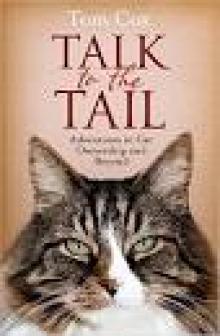 Talk to the Tail
Talk to the Tail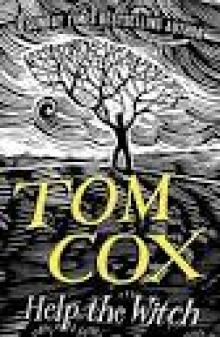 Help the Witch
Help the Witch Educating Peter
Educating Peter Nice Jumper
Nice Jumper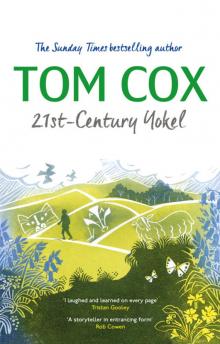 21st-Century Yokel
21st-Century Yokel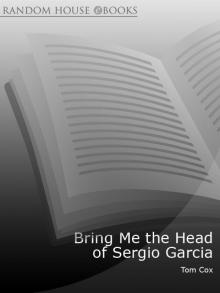 Bring Me the Head of Sergio Garcia
Bring Me the Head of Sergio Garcia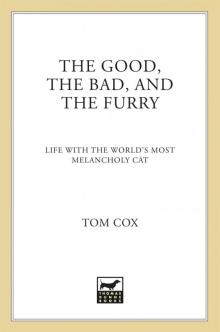 The Good, the Bad, and the Furry
The Good, the Bad, and the Furry